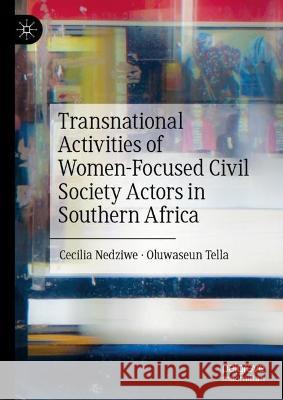Transnational Activities of Women-Focused Civil Society Actors in Southern Africa » książka
Transnational Activities of Women-Focused Civil Society Actors in Southern Africa
ISBN-13: 9783031295362 / Angielski
Transnational Activities of Women-Focused Civil Society Actors in Southern Africa
ISBN-13: 9783031295362 / Angielski
(netto: 499,55 VAT: 5%)
Najniższa cena z 30 dni: 501,19
ok. 22 dni roboczych
Bez gwarancji dostawy przed świętami
Darmowa dostawa!
This book engages norms, in general, and how they have proliferated in a neo-liberalising context since the 1990s. It particularly examines norms on gender in terms of agency and influence and their impact which amounts to game-changing. Despite growing transnational activities, regionalisation and the increasing interface between state and non-state regionalism in a transnational context since the advent of liberalisation and democratisation, analyses in regional International Relations (IR) studies, so far, largely maintain a linear logic. The increasing non-state processes, and their connection to state processes in norm creation, norm adaptation, norm diffusion and implementation around broad questions of security including in the area of gender, amount to regional thickening. Regional thickening revealed in terms of increasing regionalisation, regionalism, and region-ness whose effect is game-changing challenges mainstream linear approaches in regional IR studies. Game-changing here, refers to, processes promoting the development of norms in the interest of contributing to improved security across a region. This book focuses on Southern Africa, defined here, as the Southern African Development Community (SADC) region. This study’s analytical approach is informed by alternatives to mainstream approaches, emphasising processes, rather than linearity inherent in regional IR studies. By privileging the actual game-changing processes, interactions, and agency around the norm development cycle, this book examines how regional thickening in a transnational context promotes game-changing activities, promoting the development of the norm cycle, seeking to have improved security. A mixed method approach involving gathering of information from multiple primary and secondary sources is used. The study reveals that transnational activities and regionalisation of gender and women-focused civil society actors are critical to game-changing. These civil society actors organise in two ways. First, by way of advocacy and in seeking representation within intergovernmental policymaking structures at a regional level.
This book engages norms, in general, and how they have proliferated in a neo-liberalising context since the 1990s. It particularly examines norms on gender in terms of agency and influence and their impact which amounts to game-changing. Despite growing transnational activities, regionalisation and the increasing interface between state and non-state regionalism in a transnational context since the advent of liberalisation and democratisation, analyses in regional International Relations (IR) studies, so far, largely maintain a linear logic. The increasing non-state processes, and their connection to state processes in norm creation, norm adaptation, norm diffusion and implementation around broad questions of security including in the area of gender, amount to regional thickening. Regional thickening revealed in terms of increasing regionalisation, regionalism, and region-ness whose effect is game-changing challenges mainstream linear approaches in regional IR studies. Game-changing here, refers to, processes promoting the development of norms in the interest of contributing to improved security across a region. This book focuses on Southern Africa, defined here, as the Southern African Development Community (SADC) region. This study’s analytical approach is informed by alternatives to mainstream approaches, emphasising processes, rather than linearity inherent in regional IR studies. By privileging the actual game-changing processes, interactions, and agency around the norm development cycle, this book examines how regional thickening in a transnational context promotes game-changing activities, promoting the development of the norm cycle, seeking to have improved security. A mixed method approach involving gathering of information from multiple primary and secondary sources is used. The study reveals that transnational activities and regionalisation of gender and women-focused civil society actors are critical to game-changing. These civil society actors organise in two ways. First, by way of advocacy and in seeking representation within intergovernmental policymaking structures at a regional level.











